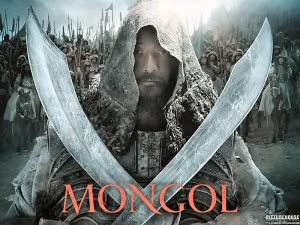Mongol
Cast: Tadanobu Asano, Sun Honglei, Khulan Chuluun
Director: Sergei Bodrov
Now Playing at: Ritz Five Philadelphia (as of July 20, 2008)
Language: Mongolian (with English sub-titles)

One of history’s colorful characters, Genghis Khan a.k.a. Temudgin was the great Mongol leader who lived from 1162-1227.
Released in June in the U.S. to mostly favorable reviews, Sergei Bodrov’s Mongol is a sympathetic portrait of Genghis Khan, a man often reviled as a brutal monster in the West.
Filmed in some of the desolate spots on Earth in Mongolia, China and Kazhakstan with a diverse cast of actors hailing from several countries, Mongol is a decent historical movie that brings to life a man who united the disparate nomadic Mongol tribes under his leadership.
Mongol, the movie, is the sweeping account of a man who sought to provide basic laws for the Mongol tribes.
The movie begins when Temudgin is nine-years-old and, according to the tradition of the day, time to look for a bride. So accompanied by his father Esugei (Ba Sen), a tribal leader, and a handful of close associates, young Temudgin (Odnyam Odsuren) embarks on a journey to pick a bride from the Merkit clan.
For Temudgin’s father, it’s also a way to make amends – and more importantly peace – because many ago before he’d stolen for his bride, a Merkit warrior’s wife.
But young Temudgin has different ideas.
When they stop on the way at a friendly tribe where his father’s friend lives, young Temudgin’s attention is attracted by a lively and slightly older girl called Borte (Bayertsetseg Erdenebat) who tells him that smart men chose brides from her clan and offers herself as the candidate for Temudgin. Before they can proceed further to their destination, Temudgin tells his father he’s chosing his bride from this clan, much to his father’s chagrin.
Yes, Temudgin picks Borte.
Director Sergei Bodrov uses this episode in Genghis Khan’s early years to impress upon the audience that even at such an early age Temudgin was different from the others.
On the journey back home, Temudgin’s father is poisoned and dies in the young boy’s arms heralding the beginning of hard times for Temudgin and his family. Targutai (Amadu Mamadakov), an underling of his father takes over the leadership of the tribe and vows to kill the young Temudgin when he’s grown up.
In the following years, the grown-up Temudgin (played ably by Japanese actor Tadanobu Asano) endures much suffering with the sole silver lining of that painful period being his marriage to the now grown-up Borte (Khulan Chuluun).
But Borte is soon kidnapped. When Temudgin finds her after more than a year with the help of his blood brother Jamuhka (the Chinese actor Honglei Sun), we find the young Borte pregnant with a swollen belly. But an unblinking Temudgin accepts the child as his own. Such is his love for Borte.
Plenty of Gore
Since Mongol is after all the sweeping story of Genghis Khan, you can expect plenty of blood and gore in battles where arrows fly with deadly effect and swords strike down with cruel severity.
While the battle scenes picturized on the screen are not grand epic battles that will be spoken of for decades, they are handled well.
Mongol is not just about riding on horses across the vast steppes or showing us close-up scenes of battles.
There’s also great romance in the abiding love of Temudgin for Borte and rich drama when blood brothers Temudgin and Jamukha become rivals and wage a fierce battle.
The photography of the forbidding and desolate landscape is pleasing.
Tadanobu Asano (who plays the adult Temudgin) and Tadanobu Asano (this Chinese actor plays the grown-up Jamukha) are competent actors and leave no room for complaint.
For the character of Borte, Bodrov picked a young Mongolian girl Khulan Chuluun, who had never acted in a movie before. But Khulan Chuluun’s fine performance makes it hard for viewers to believe that Mongol is indeed her cinematic debut.
The movie proceeds at a brisk Mongolian trot and overall director Bodrov has done a good job of translating to the big screen the story of a brave man about whom so little is known save his ferocity.
Of course, with virtually no written history available from Genghis Khan’s period (the great Khan was himself believed to be illiterate just like our Great Moghul Akbar), Bodrov surely must have taken artistic license with the story.
Since Mongol stops at the end of one great battle when Temudgin is still in his thirties, it’s possible we’ll see sequels.
And we look forward to seeing more of this ferocious Mongol Genghis Khan in all his glory.

You must be logged in to post a comment Login